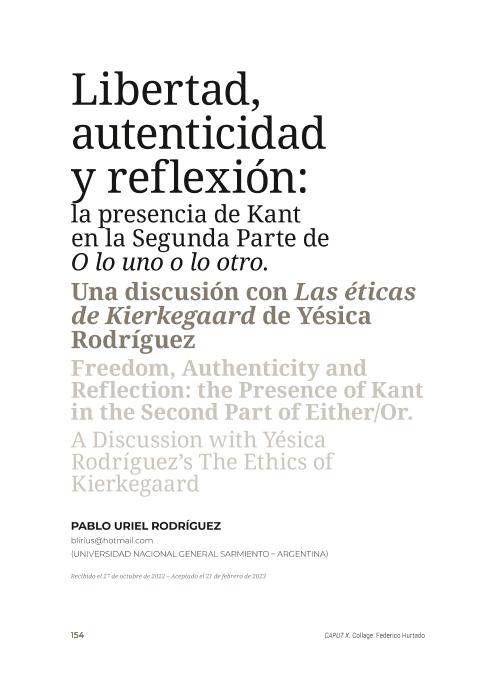Artículo
Nuestro artículo discute la tesis principal de la primera parte de Las éticas de Kierkegaard (2022). La investigación de Yésica Rodríguez se ocupa de la relación de Kierkegaard con la filosofía moral de Kant, un tema que no ha recibido la suficiente atención en los estudios kierkegaardeanos en español. Yésica Rodríguez sostiene que el juez Guillermo, pseudónimo de Kierkegaard, recurre a Kant para construir su propia versión existencialista de la ética de la autonomía. Según nuestra lectura, la visión de la vida del juez Guillermo rechaza conscientemente el rigorismo moral de Kant y se concibe como un correctivo a la ética formal kantiana. El juez Guillermo elabora una ética de la autenticidad que procura superar la oposición entre el deber y las inclinaciones. Our article discusses the main thesis of the first part of The Ethics of Kierkegaard (2022). Yésica Rodríguez’s research deals with Kierkegaard’s relationship with Kant’s moral philosophy, a topic that has not received sufficient attention among Kierkegaardean studies in Spanish. Yésica Rodríguez argues that Judge Guillermo, Kierkegaard’s pseudonym, resorts to Kant to construct his own existential version of the ethics of autonomy. According to our reading, Judge Wilhelm’s vision of life consciously rejects Kant’s moral rigorism and is conceived as a corrective to Kantian formal ethics. Judge Wilhelm develops an ethics of authenticity that seeks to overcome the opposition between duty and inclinations.
Libertad, autenticidad y reflexión: La presencia de Kant en la Segunda Parte de O lo uno o lo otro Una discusión con Las éticas de Kierkegaard de Yésica Rodríguez
Título:
Freedom, Authenticity and Reflection: The Presence of Kant in the Second Part of Either/Or. A Discussion with Yésica Rodríguez’s The Ethics of Kierkegaard
Fecha de publicación:
11/2023
Editorial:
Red Argentina de Grupos de Investigación en Filosofía
Revista:
Ideas
e-ISSN:
2451-6910
Idioma:
Español
Tipo de recurso:
Artículo publicado
Clasificación temática:
Resumen
Palabras clave:
Kierkegaard
,
Kant
,
Libertad
,
Ética
Archivos asociados
Licencia
Identificadores
Colecciones
Articulos(SEDE CENTRAL)
Articulos de SEDE CENTRAL
Articulos de SEDE CENTRAL
Citación
Rodríguez, Pablo Uriel; Libertad, autenticidad y reflexión: La presencia de Kant en la Segunda Parte de O lo uno o lo otro Una discusión con Las éticas de Kierkegaard de Yésica Rodríguez; Red Argentina de Grupos de Investigación en Filosofía; Ideas; 18; 11-2023; 154-193
Compartir




